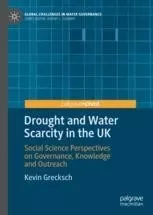Dr Kevin Grecksch
Departmental Lecturer and Course Director, MSc in Water Science, Policy and Management
Departmental Lecturer and Course Director, MSc in Water Science, Policy and Management
Academic Profile
Kevin is a social scientist who specialises in normative and analytical aspects of governance, especially with regard to water and climate change adaptation. His research interests include (multilevel) environmental governance, water governance, climate change adaptation, governance of societal transformation processes, property rights and the governance of natural resources, sustainability and ecological economics. Kevin has a particular interest in why and how power relationships, institutions and knowledge shape the governance of water and climate change.
Kevin is passionate about public engagement with research and his research impact. He has organised two successful drought walks in Birmingham and London, walking and discussing issues of drought and water scarcity with stakeholders at places where drought happened. A subsequent poster about the two walks won the Best Poster Award at the 2019 European Society for Ecological Economics conference. Moreover, he has contributed insightful blog articles for the University of Oxford's Science blog and his research on drought and water scarcity is now a lesson plan for Year 10 GCSE Geography students. He has also contributed ideas to a primary school story book about a drought super hero.
Prior to joining the School of Geography and Environment, Kevin was a British Academy Postdoctoral Fellow (2018-2021) and postdoctoral fellow (2015-2018) at the University of Oxford's Centre for Socio-Legal Studies where he remains an associate. Before coming to Oxford, he was postdoctoral researcher and projects coordinator at the University of Oldenburg's Centre for Environmental and Sustainability Research (COAST) where he coordinated projects on sustainable bioenergy supply chains and marine energy potentials. In summer 2013, Kevin was visiting researcher at Nelson Mandela University, Port Elizabeth, South Africa. Before joining COAST, he was doctoral researcher and lecturer in Ecological Economics at the University of Oldenburg's Department of Business Administration, Economics and Law, researching the governance of climate change adaptation.
Kevin is the co-editor of the Palgrave Macmillan book series 'Global Challenges in Water Governance'. He is also a Research Fellow in the Earth System Governance Project, the world's largest network of social scientists interested in global environmental change and its governance challenges.
Current Research
Kevin's ongoing research on water and climate change governance addresses questions of power relationships, the role of institutions and knowledge. In the recent past his research was part of the multidisciplinary ENDOWS (ENgaging diverse stakeholders and publics with outputs from the UK DrOught and Water Scarcity programme) and MaRIUS (Governance of Water Scarcity and Drought in the UK) project that engaged legal scholars, economists, human geographers, hydrologists, and climate scientists in the development of a more risk-based approach to governance of drought. Kevin was also the PI of a John Fell Fund supported project on 'Managing drought and water scarcity - Strategies and options for the UK's large industrial water consumers'. His research into drought and water scarcity in the UK resulted in a monograph 'Drought and water scarcity in the UK: Social science perspectives on governance, knowledge and outreach' published with Palgrave Macmillan in 2021.
His current research includes:
Out of sight, out of regulation
The research advances theoretical and practical perspectives on underground space governance in the UK. It bridges scholarly perspectives and practitioners' experiences to develop new governance modes for underground space use including increased recognition in land use planning. In the light of increasing claims on the underground space for fracking, transport, geothermal energy or carbon capture and storage, the research assesses the question how an improved and sustainable governance of underground spaces can be ensured to protect for example drinking water. Geological underground models deliver only frameworks for possible uses and we do not know much about the context between geological characteristics and the human uses, demands and changes of underground space. Moreover, governing underground space can be complicated as it involves conflicting objectives and regulatory frameworks. One key objective of this research is to conceptualise a new approach to underground governance and regulation that takes into account its diverse uses and various stakeholders' claims on underground resources.
Property Narratives
Property rights are essential in western market societies and often taken for granted. They are ubiquitous and we do not question them. They are also a crucial element in the discussion of natural resource management. In the context of climate change, understanding our concept of property rights, and how it influences our interpretation of who natural resources belong to, becomes increasingly important. At a basic level, property rights usually provide the owner exclusive, guaranteed rights, which always includes the notion of excludability. If an individual is the proprietor of a natural resource, this person determines access and allocation. This exclusive right is usually protected by the state. Problems stem from when property rights on resources cause inequalities of access to necessary resources like water, or are an obstacle for the successful implementation of climate adaptation measures. Many would see property rights as 'natural' - yet they are far from natural. They express a social relationship that is very specific to western liberal democracies. For instance, many indigenous people have a concept of property and possession that does not serve the individual but society. It is often based on customary law with complex structures and rules to protect and regulate access to natural resources and the knowledge about it.
Hence, a new perspective, taking into account narratives surrounding property could provide useful insights and add to the mere administrative and regulatory perspective of property rights. Narratives are people's accounts of events by which they or others were affected. They often come in the form of stories. In the context of property rights, narratives look at stories told about property rights, at how people see themselves and others in this social construct, at stereotypes, collective memory and how property influences identities - especially collective identities. Hence, property rights may exist and they provide legal certainty, but they are not the end of the story. People have an attachment to nature, to places and often refer to 'my river' or 'my forest'. Successful adaptation to climate change should take these narratives into account. In addition, people often have a deep knowledge about natural resources in their area and tapping into this knowledge could prove to be very useful, and also support acceptance and legitimacy of climate change adaptation measures.
Teaching and Supervision
Kevin is the course director of, and teaches on, the MSc in Water Science, Policy and Management (WSPM). Kevin is responsible for the 'Water Management' module, the 'Research Design & Skills' module and he teaches the 'Economics, Law & Governance of Water' module.
Kevin is keen on active learning methods and his past teaching includes qualitative social science research methods, climate change adaptation, water resources management, environmental policy and politics, corporate environmental and sustainability strategies, property rights and natural resources and practical projects in sustainability.
Current Graduate Research Students
| Patricia Allgaier | Impacts and Implementation of EU Regulation 2020/741 on Water Reuse |
| Jess Ryan-Smith | Greener grass: exploring the potential of residential lawn conversion from turf to native planting in Chicago |
| Florian Steig | Designing a Warming World: Power and Knowledge in the Global Governance of Sinking Cities |
Selected Publications






